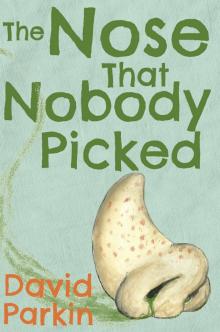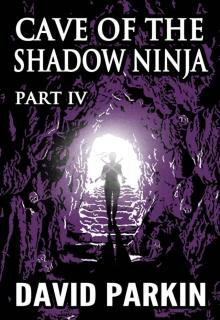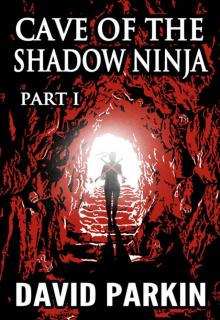- Home
- David Parkin
Cave of the Shadow Ninja: Part II
Cave of the Shadow Ninja: Part II Read online
CAVE OF THE SHADOW NINJA
PART II
DAVID PARKIN
Contents
Title Page
Map
Part II: Akiko
Chapter 1
Chapter 2
Chapter 3
Chapter 4
Chapter 5
Chapter 6
Chapter 7
Part III Preview
About the Author
Acknowledgments
Copyright © 2017 David Parkin.
All rights reserved. No part of this book may be used or
reproduced by any means, graphic, electronic, or mechanical,
including photocopying, recording, taping or by any information storage
retrieval system without the written permission of the publisher, except in the
case of brief quotations embodied in critical articles and reviews.
Library of Congress Catalogue Number: TXu 2-013-773
[email protected]
www.daveparkin.com
Map, Title Page, and Chapter Illustrations by Rachel Everett
Cover art by Danny Haas
For Junior, who was born in the middle of chapter six.
CHAPTER ONE
“The work of the wielder is only as sharp as his blade,” Akiko remembered one of her many masters had said. “But which one? Was it the Mercian or Kungun in The Eternal City?” As a homeless child, she had spent her life as a wanderer, attempting to glean what morsels of knowledge she could from those willing to teach her. Through the years, so many names and faces passed, they became like ancient ruins dotting the shores of the Quang River, each worth acknowledgement, but after so many miles, they all began to look the same. The fog of time was too thick, she decided, but whoever said it, it was good advice.
Akiko pulled her mind from its drift on the tide as she drew one of six dangerous-looking knives from a pouch on the table before her. Like most parts of her life, the room she worked in was a pieced-together addition to the back of a larger building. Akiko built this room for one reason, to house the sacred blades, now reflecting the strips of morning light coming in through the bamboo walls. With a masterful hand, she worked each knife’s folded steel over a flat wet stone, moving with slow and calculating grace. Periodically, she tested each blade’s edge on the fresh-cut shoulder of a butchered pig, taking care to examine the wound. To a master, the worth of a blade didn’t lie solely in its sharpness but also in the shape of the wound it opened and how the steel drank what spilled from inside. There were many in her profession but none, anymore, who took the time to focus on such details.
Ever since she was knee high, Akiko knew her destiny promised more than the life the men of Bushan were willing to give. From birth, a Bushanese woman lived with two options for a future: a subordinate wife and mother, or the steamy hell of a laundry house. If one chose motherhood, dire consequences and dishonor came to any who offered her husband less than an army of healthy sons. Daughters like Akiko were, well, acceptable as long as they had brothers.
Akiko did have brothers, so many in fact that hope for any real regard at home was fruitless. But The Ancient Ones pulled a trick on Akiko’s mother and father, giving her, their youngest child and only daughter, the strongest will of all their children. “Her clay is dry!” Akiko’s father announced one evening, at wits’ end. “Her will would likely break before it bent.”
It wasn’t long after this that Teshi, the local laundress and notorious heavy hand, appeared at their door. With a wider neck and stronger arms than any man or woman Akiko had ever met, Teshi took upon herself the challenge of breaking Akiko’s clay. After four days, however, the young girl’s will stayed strong and the laundress’ patience, and her whip, had come to its end. Shortly after her return, Akiko stole away in the night. The way she saw it, with one less mouth to feed and one less burden to bear, the only way to make her family happy was to leave.
With no kin to guide her, Akiko became a “buhn,” one among an army of wandering orphans, mostly girls, abandoned or cast out by their families. Across most of both worlds, having a son meant opportunity, advancement in class, and the comfort of knowing an heir was in place to carry on the family legacy. A daughter, however, was nothing but a burden or a problem to be “dealt with.” The buhn became the most disgraceful and hypocritical solution in two worlds so preoccupied with “honor.” As wild denizens, the lost daughters of Bushan roamed the countryside, laboring in orchards, farms, factories, and other, more scandalous, professions.
One doesn’t need a great imagination to understand the dangerous life the orphaned girls endured. After Akiko’s own experiences with the sinister foremen and the predatory dogs in the red lantern alleys of Bushan, she made up her mind to find a different path than those the buhn had set in place.
Her dream was the samurai, the most respected and honorable warriors idolized by all of Bushan. Of course, any training by traditional means was out of the question for a girl. So Akiko spent her youth hunting and gathering pieces of instruction from anyone willing to share them. She collected mentors like most collected flowers or monk’s blessings, picking them up where she could across the countryside. There was the Akai stableman, who taught her to ride; the mage in Mercia, who taught her a respect for magic and how to survive off the land; the Scocian trader, who showed her that there was pride to be found in every line of work; and, of course, the famous Sato, the one man with the most open of hearts and closed of minds in the two worlds. Akiko tried as she might, but none would take her on permanently, and the mantle of a samurai moved further and further from her reach.
It wasn’t until just a few years ago, while making her way across Kaito, that Akiko discovered an unexpected love for the prospering city of Paoyang beneath the creeping palace. Here, in the most progressive city in both worlds, she finally abandoned her dreams in order to build a life of her own. These knives she so carefully honed represented that struggle and deserved the respect she awarded them.
As Akiko finished sharpening the final blade, she playfully flipped it in the air, caught it by the steel, and threw it with surgical precision across a small courtyard into a board that read, Daily specials, served with rice. Satisfied, Akiko pulled the knife from the board and put it to work in a pocket-sized kitchen cutting fish, vegetables, shrimp, and chicken in the light of the morning.
“Will you marry me?” Mo-Shi, a skinny shopkeeper from town begged later that morning as Akiko entered the dining area of her modest eatery.
“We’re starting early today?” Akiko asked, smiling to Mo-Shi, San-Shi, and Kobo-Ya, three friends and regular customers sitting together.
“You’re the greatest cook in Kaito!” San-Shi announced as the skinny barrel maker raised his glass. “We’ll keep asking until you say, ‘yes’!”
“No, I want to marry her!” Kobo-Ya, the round-bellied cobbler offered. “You can’t take her cooking away from me!”
“Although you should take yourself away once in a while.” Kobo-Ya and his friends laughed as Akiko patted him on his round belly.
Akiko worked alone, taking extreme pride in every dish she served. The eatery was small, clean, and bright, and the quality of her work kept it crowded. Despite its extreme popularity, however, she struggled daily to keep her business working. Paoyang might have been a “progressive” city, but even there, a business with a woman’s name on a lease could expect surprise taxes, gouging, and favoritism over other male-owned establishments on a regular basis.
Most of her customers, like the three calling to her from the bar, ate every meal at her place and treated her with deep respect. Sometimes, however, a customer required prompting to see thin
gs her way.
That afternoon, as the day wound down and the seats began to empty, a man and a woman she did not recognize entered. By the way the woman held her head, Akiko sensed the couple shared a far from “loving” relationship. The woman wore a robe dyed in the soft blue of the bellflowers south of the province. The scarred and angry man at her side was a merchant, dealing in the rope made from the flower’s stalks. As they sat, the man spoke to his wife with sharp and stabbing words that Akiko needn’t hear to understand.
“Welcome,” Akiko offered pleasantly as she approached the couple.
“Whatever’s hot,” the man shot back, not bothering to make eye contact.
As Akiko made her way to the kitchen, the couple’s hushed conversation suddenly erupted. “That’s not the point!” the man blurted out, grabbing her wrist and knocking his wife’s teacup to the ground with a shatter.
“Let me help you with that,” Akiko interrupted, arriving back at the table so quickly she startled the angry man.
“Get my dinner, woman!” he spat at her. “I’m talking to my wife.”
“It’s not a problem,” Akiko reassured him, speaking only to the woman. “I’ll clean this up.”
“She’s clumsy,” he said with a taunting smirk, watching Akiko wipe the tea off the floor. “But don’t worry, she’ll pay for it, believe me.” The man gave his wife a look so sharp with the promise of vengeance that she shifted in her seat.
Below the table, Akiko pulled a small, round, unassuming envelope from her robe and covertly slid it below the man’s reclined chair leg.
“There we go, just like new,” Akiko said, getting to her feet and setting a new cup in front of the wife. As she made her way back to the kitchen, the man leaned forward in his chair and ignited a small and calculated blast at his feet. The orange fire burst around him, catching onto his pants leg and crawling quickly toward his waistline. Panicked, the man leapt into the air, kicking and flailing as the fire burned his legs and backside. With no other choice, he fell through the open window behind him and splattered into the stinking muck of the pigpen outside.
The patrons’ uproarious laughter followed the man out the window as the flames sizzled out at his feet. He tried to stand, still smoking and covered in filth, while his wife attempted to tame the smile encroaching on her lips. On her way out, the woman set money on the counter by the door but Akiko stopped her, placed the money and a wooden box of food in her palm, and said, “Lunch is on me today,” with a wink.
“And the pigs’ lunch is on your husband!” Mo-Shi called out, renewing the patrons’ laughter.
Finding a place at all in this world did not come easy or often for the buhn. Walking past the pleasure districts of Loyang became a daily reminder of where Akiko might have found herself had she given up. Keeping a nook like her restaurant, in such a small corner of the map, required daily struggle. Keeping her customers happy was her way of ensuring she triumphed over the dangerous wager she made with her life all those years ago. But as one of her masters had once taught her, “There’s nothing more healthy or more dangerous than change.”
Days later, Akiko’s customers, including Mo-Shi and his friends, filed in for dinner. As the patrons took their seats, Akiko noticed a mysterious woman at the end of the bar who, she could swear, had not entered with the rest of the crowd. The woman sat quiet and alone, dressed in a black robe as dark and flawless as a moonless night. A large-brimmed black hat obscured the rest of her features save for the mane of unkempt gray hair falling down the woman’s back.
“Tea?” Akiko asked, approaching with a cheerful grin.
“You’re the famous cook?” the woman gargled back in a voice sick with decay.
“I’m just a cook,” Akiko tiptoed.
“They speak of your skill across the province,” the woman said, keeping her head low. “Don’t be modest.”
“Do I know you?” Akiko asked.
“Kubaba,” the old woman grumbled. “We’ve met before, but we both wore shozoko masks at the time so I understand if you don’t recognize me.”
Akiko inhaled sharply. Wearing the mask and black cowl worn by thieves and assassins was no light accusation. If this woman was making a joke, Akiko was not impressed.
“Can I get you some tea?” Akiko asked, trying to ignore Kubaba’s obvious character flaws.
“Sure, some tea, Shadow,” the old woman said, sneaking that last word in with a knowing cadence.
“Today, I’m serving shark fin soup. Are you hungry?”
“Be warned,” San-Shi interrupted from down the bar, “after eating here, all the food you eat for the rest of your life will taste like wet laundry.”
“They’re exaggerating,” Akiko said over grumbling agreements from the others.
“We’re in love!” Kobo-Ya announced with pride.
“They’re also drunk.”
“We’re also drunk!” Mo-Shi clamored to the patrons’ renewed laughter.
“I never eat an animal I didn’t kill myself, Shadow,” Kubaba grumbled, pronouncing the word this time with even more prominence.
“My name is, ‘Akiko,’” Akiko corrected her with annoyance now audible in her tone.
“No,” The old woman cut, “you gave up your name when you joined the shadows, when you became a Ninja.” The word drew a silent breath from the crowd, hushing the room. Akiko set down her teapot, so offended words escaped her.
“Looks like we’re not the only drunks in here today,” San-She laughed. “If you want ‘Ninjas,’ they’re at the restaurant for imaginary creatures down the road with the ghosts and fire breathers, and the—”
“Woman willing to marry Kobo-Ya!” Mo-Shi interrupted, igniting another wave of laughter that relaxed Akiko a bit.
“I’m sorry, but you’re mistaking me for someone else,” Akiko offered.
Kubaba, now done with words, looked up, revealing two white eyes beneath the brim of her hat. As she turned and walked away, her sinister smile full of blackened teeth suggested she wasn’t done with Akiko.
As soon as she’d gone, the patrons returned to their meals as though the exchange had never happened, leaving Akiko alone to attempt shrugging off the disturbing memory. The Ninja may be a myth in most parts of the world but where Akiko came from, the very implication of Ninjitsu, their cursed martial art, came as the deepest offense.
By the time she closed and cleaned up for the night, Akiko had pushed the strange encounter to the back of her mind. The crickets had already begun singing their song to the waning moon as she gave a satisfied glance over her polished tabletops and clean floors. Behind the restaurant, Akiko moved across the small courtyard through the warm glow of a large red lantern above her. As she approached the metal fence surrounding the yard a hand suddenly appeared from outside the wrought iron gate.
Akiko jumped back, surprised, then relaxed as Po-Yin, a young mother appeared from the darkness, holding her sick three-year-old son. “I’m sorry. Is this a bad time?” she asked quietly.
“No, of course not,” Akiko said, with a relieved sigh. “Come in.” She signaled to a table beneath the lantern where Po-Yin laid the boy.
“He’s been like this all day, weak, cold, then hot,” Po-Yin offered with concern in her voice.
“Stomach cramps?” Akiko asked, looking over the boy.
“Yes.”
Akiko caressed his forehead, leaned in close, and breathed deeply. “He just ate some bad grouper,” she said with a smile. “He’ll feel better in the morning.”
Po-Yin relaxed, relieved. “I’m sorry,” she said, curiously, “but did you smell that on him?”
“I’ve just seen it before,” Akiko replied with a smile.
Po-Yin nodded, a little embarrassed as she picked up her son and offered a few coins. Akiko waived the payment away. With equal amounts of surprise and relief, Po-Yin bowed a deep “thank you,” and carried her son into the alley.
Healing was a skill Akiko had picked up in her days running from everyth
ing and nothing. She knew Po-Yin’s family and imagined the worried conversation they must have had before bringing their son to her. Times were too tough in Poyang to justify taking a day’s pay for a tummy ache.
With a pleasant feeling in her bones, Akiko locked the heavy metal gate and turned toward the rope holding the large lantern over the center of the courtyard. But as she approached the knot, she noticed something off; the crickets had quieted slightly.
It must be a storm, Akiko thought as their sounds faded into silence. But suddenly her tingling senses read much more than rain. An emptiness like a hole in the night began filling the space the crickets had occupied only moments before. Without a second thought, Akiko knew the source. “I told you, old woman,” she cut, cold and forceful, “you’ve made a mistake.”
“A skilled chef and a master healer, too?” Kubaba’s voice echoed through the courtyard from an unknown position. “Such noble work for a criminal.”
“The Ninja are a myth!” Akiko stated strongly, despite her shaking knees.
“Where is your family?” Kubaba’s voice called from the shadows. “Have you convinced yourself they’re dead yet? Do you tell people you’re an orphan?”
“I tell people the truth,” Akiko declared. “Where’s your family, witch?” Suddenly, a loud crack, followed by a white flash of pain sang across Akiko’s brow as Kubaba leaped from the darkness and struck with a sword, still in its scabbard. Akiko landed with a splash in the mud of the courtyard, blood oozing from a gash on her cheek. “Please,” she whimpered, “take what you want and leave me alone.”

 The Nose That Nobody Picked
The Nose That Nobody Picked Cave of the Shadow Ninja: Part IV
Cave of the Shadow Ninja: Part IV Cave of the Shadow Ninja: Part I
Cave of the Shadow Ninja: Part I Cave of the Shadow Ninja: Part II
Cave of the Shadow Ninja: Part II